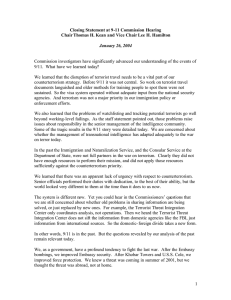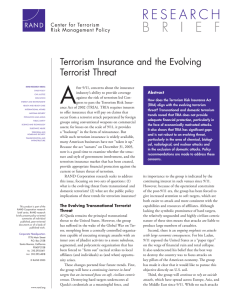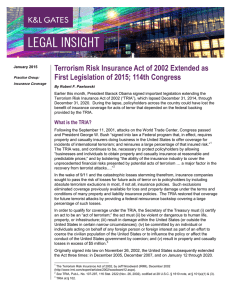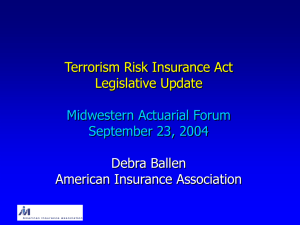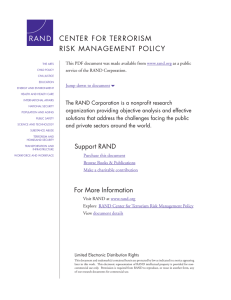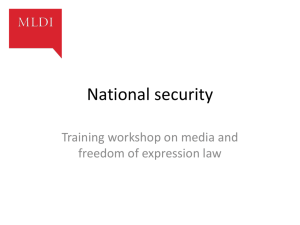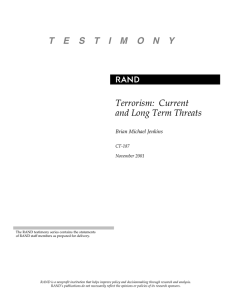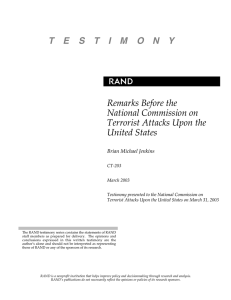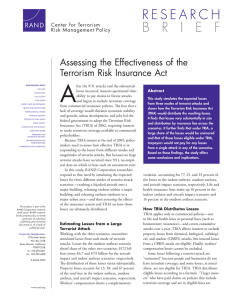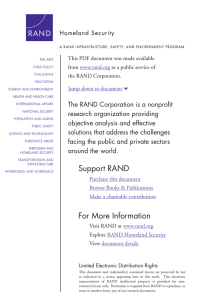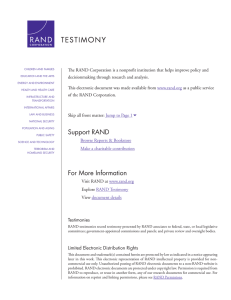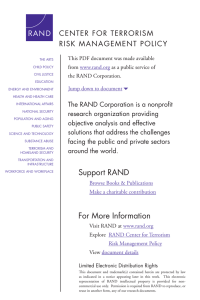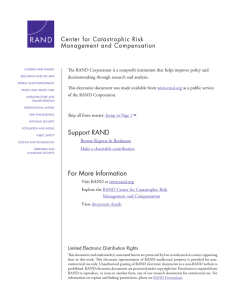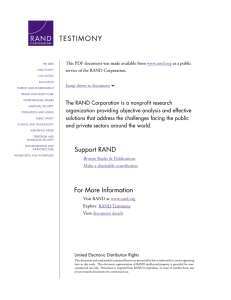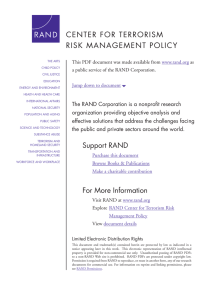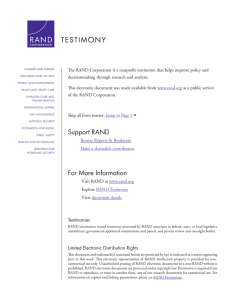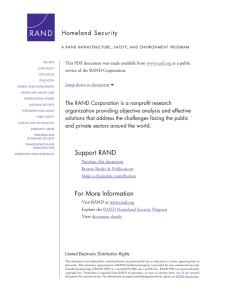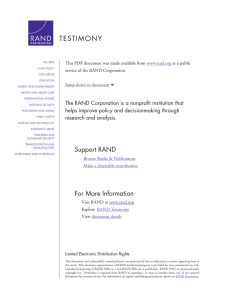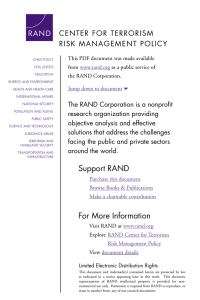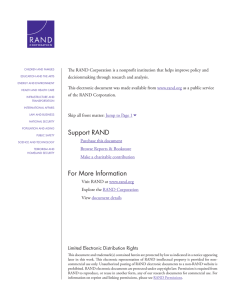HOT TOPICS
advertisement
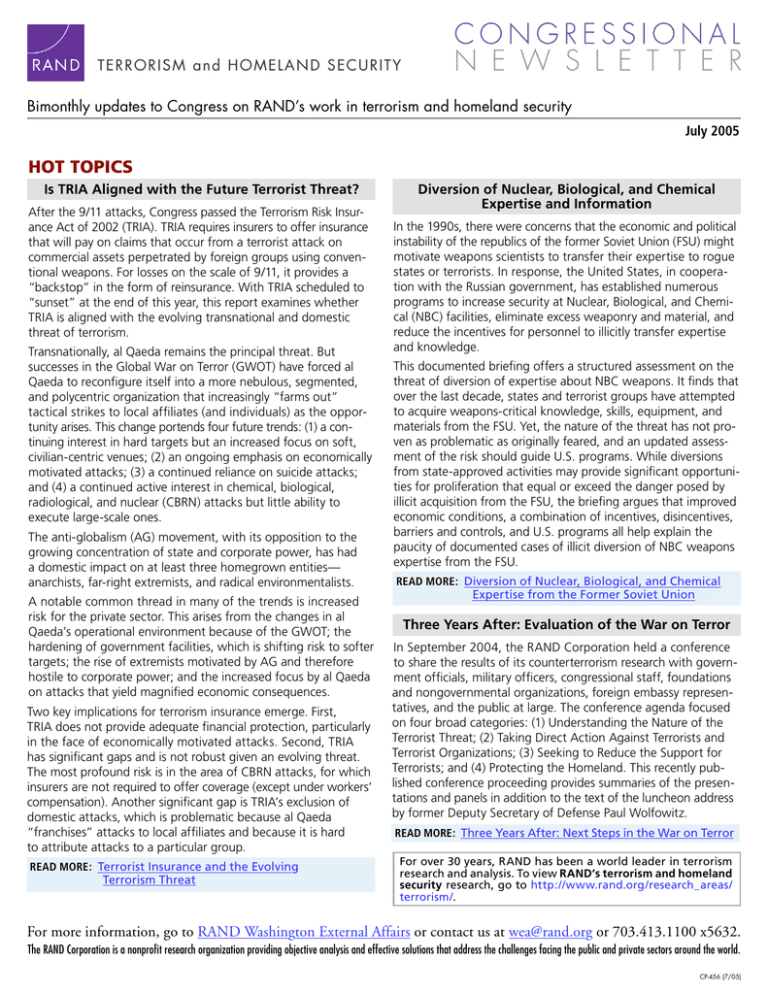
Bimonthly updates to Congress on RAND’s work in terrorism and homeland security July 2005 HOT TOPICS Is TRIA Aligned with the Future Terrorist Threat? After the 9/11 attacks, Congress passed the Terrorism Risk Insurance Act of 2002 (TRIA). TRIA requires insurers to offer insurance that will pay on claims that occur from a terrorist attack on commercial assets perpetrated by foreign groups using conventional weapons. For losses on the scale of 9/11, it provides a “backstop” in the form of reinsurance. With TRIA scheduled to “sunset” at the end of this year, this report examines whether TRIA is aligned with the evolving transnational and domestic threat of terrorism. Transnationally, al Qaeda remains the principal threat. But successes in the Global War on Terror (GWOT) have forced al Qaeda to reconfigure itself into a more nebulous, segmented, and polycentric organization that increasingly “farms out” tactical strikes to local affiliates (and individuals) as the opportunity arises. This change portends four future trends: (1) a continuing interest in hard targets but an increased focus on soft, civilian-centric venues; (2) an ongoing emphasis on economically motivated attacks; (3) a continued reliance on suicide attacks; and (4) a continued active interest in chemical, biological, radiological, and nuclear (CBRN) attacks but little ability to execute large-scale ones. The anti-globalism (AG) movement, with its opposition to the growing concentration of state and corporate power, has had a domestic impact on at least three homegrown entities— anarchists, far-right extremists, and radical environmentalists. A notable common thread in many of the trends is increased risk for the private sector. This arises from the changes in al Qaeda’s operational environment because of the GWOT; the hardening of government facilities, which is shifting risk to softer targets; the rise of extremists motivated by AG and therefore hostile to corporate power; and the increased focus by al Qaeda on attacks that yield magnified economic consequences. Two key implications for terrorism insurance emerge. First, TRIA does not provide adequate financial protection, particularly in the face of economically motivated attacks. Second, TRIA has significant gaps and is not robust given an evolving threat. The most profound risk is in the area of CBRN attacks, for which insurers are not required to offer coverage (except under workers’ compensation). Another significant gap is TRIA’s exclusion of domestic attacks, which is problematic because al Qaeda “franchises” attacks to local affiliates and because it is hard to attribute attacks to a particular group. READ MORE: Terrorist Insurance and the Evolving Terrorism Threat Diversion of Nuclear, Biological, and Chemical Expertise and Information In the 1990s, there were concerns that the economic and political instability of the republics of the former Soviet Union (FSU) might motivate weapons scientists to transfer their expertise to rogue states or terrorists. In response, the United States, in cooperation with the Russian government, has established numerous programs to increase security at Nuclear, Biological, and Chemical (NBC) facilities, eliminate excess weaponry and material, and reduce the incentives for personnel to illicitly transfer expertise and knowledge. This documented briefing offers a structured assessment on the threat of diversion of expertise about NBC weapons. It finds that over the last decade, states and terrorist groups have attempted to acquire weapons-critical knowledge, skills, equipment, and materials from the FSU. Yet, the nature of the threat has not proven as problematic as originally feared, and an updated assessment of the risk should guide U.S. programs. While diversions from state-approved activities may provide significant opportunities for proliferation that equal or exceed the danger posed by illicit acquisition from the FSU, the briefing argues that improved economic conditions, a combination of incentives, disincentives, barriers and controls, and U.S. programs all help explain the paucity of documented cases of illicit diversion of NBC weapons expertise from the FSU. READ MORE: Diversion of Nuclear, Biological, and Chemical Expertise from the Former Soviet Union Three Years After: Evaluation of the War on Terror In September 2004, the RAND Corporation held a conference to share the results of its counterterrorism research with government officials, military officers, congressional staff, foundations and nongovernmental organizations, foreign embassy representatives, and the public at large. The conference agenda focused on four broad categories: (1) Understanding the Nature of the Terrorist Threat; (2) Taking Direct Action Against Terrorists and Terrorist Organizations; (3) Seeking to Reduce the Support for Terrorists; and (4) Protecting the Homeland. This recently published conference proceeding provides summaries of the presentations and panels in addition to the text of the luncheon address by former Deputy Secretary of Defense Paul Wolfowitz. READ MORE: Three Years After: Next Steps in the War on Terror For over 30 years, RAND has been a world leader in terrorism research and analysis. To view RAND’s terrorism and homeland security research, go to http://www.rand.org/research_areas/ terrorism/. For more information, go to RAND Washington External Affairs or contact us at wea@rand.org or 703.413.1100 x5632. The RAND Corporation is a nonprofit research organization providing objective analysis and effective solutions that address the challenges facing the public and private sectors around the world. CP-456 (7/05)
